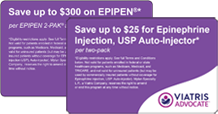
Life doesn't just happen at home.
Whether you’re hitting the open road or heading to the airport, travel can become more complicated when you or your child has an increased risk for a life-threatening or severe allergic emergency (anaphylaxis). That’s why it’s important to be careful to avoid allergens anywhere you go. And wherever life takes you, don’t forget to pack EPIPEN® (epinephrine injection, USP) or EPIPEN JR® (epinephrine injection, USP) Auto-Injectors (or their authorized generics)
Flying
By taking a few precautions, you can reduce the risk of a life-threatening allergic reaction (anaphylaxis) while flying.
-
Start with a little research
Before booking a flight, ask your healthcare professional about your risk of anaphylaxis aboard an aircraft and about key precautions you can take. If you're cleared for air travel, call your airline to report your potentially life‑threatening allergies and find out about the foods and snacks being served on your flights. Before you leave, locate an allergist or hospital near your destination, just in case. -
B.Y.O.F. (bring your own food)
Rather than relying on airport food vendors or the airline, pack your own snacks for the trip, and bring extra in case you're delayed. The Transportation Security Administration (TSA) permits air travelers to carry food from home onto planes—just make sure it's wrapped or in a container. -
TSA regulations for medications
You may request that your EPIPEN Auto-Injectors or their authorized generic be inspected visually rather than X-rayed since the effects of X-rays on epinephrine are unknown. Make sure your epinephrine auto-injectors and other medications are clearly labeled; you may want to write your name on them as well. It’s not necessary, but you may want to also bring a note from your physician explaining that your auto-injector contains epinephrine—a medicine for anaphylaxis.
-
Speak up at the gate
When you reach your gate, tell the airline staff about your severe allergy. While airlines can’t always guarantee flights will be free of your allergic triggers, they may avoid using latex products or ask passengers in your row and in the rows around you to refrain from eating your trigger food(s). -
In case of anaphylaxis, alert the crew right away
If you or any children with severe allergies begin to experience anaphylaxis, administer EPIPEN or EPIPEN JR Auto-Injector (or their authorized generics) and then immediately tell a member of the flight crew. -
Always carry your EPIPEN or EPIPEN JR Auto‑Injectors
Pack your EPIPEN 2‑PAK® or EPIPEN JR 2-PAK® (or their authorized generics) in your carry‑on bag. When you board the plane, keep it with you, not in the overhead bin—if you need it, you’ll want to be able to access it quickly.
Road Trips
By taking a few precautions, you can reduce the risk of a life-threatening allergic reaction (anaphylaxis) while traveling.
-
Plan your meals
Before you leave home, decide how and where you’re going to eat. You’ll want to pack plenty of nonperishable, allergen‑free foods for the ride, as well as research restaurants and make reservations for your trip.
If there are special foods you need (or like) that may not be available at your destination, stock up before you leave. -
Consult Allergyeats.com
Allergyeats.com provides a searchable database of many allergy‑friendly restaurants across the country. -
Check your meds
Be sure to check the expiration dates of all medications, including your EPIPEN Auto‑Injectors (or their authorized generic). Make sure that the epinephrine solution in the window of the auto-injector is clear. If the epinephrine solution is discolored (pinkish or brown color) or contains solid particles, speak with your healthcare professional immediately and replace your epinephrine auto-injector. You may want to bring extra supplies in case of an emergency. You may also want to research which pharmacies and hospitals are along your route.
Traveling Globally
Visiting a foreign country? Make your trip a success by following these simple tips.
-
Before you leave:
- Make sure you have necessary medications, including your EPIPEN Auto-Injectors or their authorized generic. Check expiration dates, and consider bringing extra supplies. If you run out while traveling, the products you need may not be available in foreign pharmacies.
- Learn the names of your allergens in the languages of the countries you’ll visit. Be able to say and write them so you can alert others to your condition. You might want to consider allergy translation cards. (Selectwisely.com is one site that offers allergy translation cards for purchase.)
- Research the area you’ll be staying in. Is the country allergy‑aware? Will allergen‑free food be available? Plan to ship or bring your own food if necessary.
-
While you're there:
- Tell your traveling companions about your severe allergy or if you have any children with severe allergies. Make sure they know where you keep your EPIPEN and/or EPIPEN JR Auto-Injectors (or their authorized generics) and how to use one in case you’re unable to administer the medicine yourself.
- Consider wearing a medical ID bracelet, which can alert healthcare professionals to your condition even if you’re unable to speak.
- Locate the closest hospital and know how to get there. Determine the local phone number for emergency services.
Wherever you go, be prepared.
Use common sense, be careful to avoid your allergens, have an anaphylaxis action plan in place…and have a safe trip!
Explore
Explore the latest savings offers for EPIPEN (epinephrine injection, USP) Auto-Injectors and the Authorized Generic for EPIPEN See Terms and Conditions
Antihistamines are not recommended for the life-threatening symptoms of anaphylaxis.
heading
INDICATIONS (the following information applies to both EPIPEN and its Authorized Generic)
EPIPEN® and EPIPEN JR® Auto-Injectors are used to treat life-threatening, allergic emergencies in people who are at risk for or have a history of serious allergic emergencies. EPIPEN and EPIPEN JR are for immediate administration by you or your caregiver. They do not take the place of emergency medical care. You should get emergency help right away after using your EPIPEN of EPIPEN JR.

Patient Information
Please select from the following:

Prescribing Information
Please select from the following:



